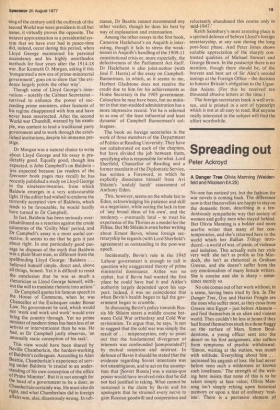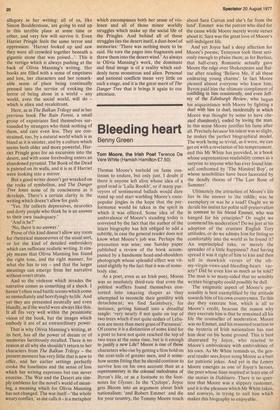Spreading out
Peter Ackroyd
A Danger Tree Olivia Manning (Waidenfeld and Nicolson £4.25) No one has noticed yet, but the fashion for war novels is coming back. The difference now is that thamovelists are happy to stay on the domestic front, describing in a tendentiously sympathetic way that society of women and guilty men who stayed behind. But Olivia Manning is a bolder and more acerbic writer than many of her contemporaries, and she's returned here to the world which her Balkan Trilogy introduced — a world of war, of panic, of violence and isolation. This actually suits her style very well: she isn't as prolix as Iris Murdoch, she isn't as rhetorical as Graham. Greene, and she doesn't suffer from the coy emotionalism of many female writers. She is concise and she is sharp — sometimes sternly so.
No one comes out of her work without, in a sense, having been tried by fire. In The Danger Tree, Guy and Harriet Pringle are the ones who suffer most, as they cross from Greece into Egypt — just before Alamein — and find themselves in an alien and violent world. They couldn't be less at home if they had found themselves stuck in a dune-buggy on the surface of Mars. Simon Boulderstone, a young officer sent into the desert on his first assignment, also suffers from symptoms of psychic withdrawal: 'Simon, waiting at the station, was numb with solitude. Everything about him . . . increased his anguish of loss, He had never before seen such a wilderness or known such loneliness.' The strength of the writing here insists that none of this is to be taken simply at face value; Olivia Manning isn't simply relying upon historical memory or upon a feat of ordinary 'realism'. There is a pervasive element pf • allegory in her writing: all of us, like Simon Boulderstone, are going to end up. in this terrible place at some time or other, and very few will survive it. Even Harriet Pringle feels the same terror and oppression: 'Harriet looked up and saw they were all crowded together beneath a. gigantic stone that was poised...'. This is the vertigo which is always pushing at the back of Olivia Manning's writing. Her books are filled with a sense of emptiness and loss, her characters and her remarkable sense of place being continually pressed into the service of evoking the terror of being alone in a world — any world, even the social world, will do — which is alien and recalcitrant.
Here, as in The Balkan Trilogy and in her previous book The Rain Forest, a small group of expatriates find themselves surrounded by strangers who think nothing of them, and care even less. They are constrained, too, by a natural world which is as bland as it is sinister, and by a culture which seems both older and more powerful. Harriet Pringle goes for an excursion into the desert, and with some foreboding enters an abandoned pyramid. The Book of the Dead is painted on its walls, and it is as if Harriet were looking into a mirror.
But a good writer doesn't get wrecked on the rocks of symbolism, and The Danger Tree loses none of its conciseness as it develops. There's a certain clarity in the writing which doesn't allow for gush: 'Yes. He collects depressives, neurotics and dotty people who think he is an answer to their own inadequacy.'
'And is he?'
'No, there is no answer.'
Prose of this kind doesn't allow any room for rhetorical manoeuvres of the usual sort, or for the kind of detailed embroidery which can suffocate realistic writing. It simply means that Olivia Manning has found the right tone, and the right manner, for what she has to say — and that the larger meanings can emerge from her narrative without overt strain.
And so the violence which invades the narrative comes as something of a shock. I haven't often read battle scenes which come so immediately and horrifyingly to life. And yet they are presented neutrally and even blandly, as if the world were always like this. It all fits very well within the pessimistic vision of the book, but the images which embody it are of an extraordinary power.
That is why Olivia Manning's writing, at • its best, has all the power of dream or of memories factitiously recalled. There is no reason at all why she shouldn't return to her characters from The Balkan Trilogy — the present moment has very little that is new to offer, and her earlier settings perfectly evoke the loneliness and the sense of loss which her writing expresses but can never exorcise. The War and the Desert are simply emblems for the novel's world of meaning, a meaning which for Olivia Manning has not changed. The war itself— 'the whole weary conflict,' as she calls it— is a metaphor which encompasses both her sense of violence and all of those minor worldly struggles which make up the social life of the Pringles. And behind all of these struggles lies the desert itself, a dust-bowl of memories: 'There was nothing more to be said. He tore the pages into fragments and threw them into the desert wind.' As always in Olivia Manning's work, the dominant and final image is of a reality which suddenly turns monstrous and alien. Personal and national conflicts mean very little on such a stage, and it is the great merit of The Danger Tree that it brings it again to our attention.
































 Previous page
Previous page